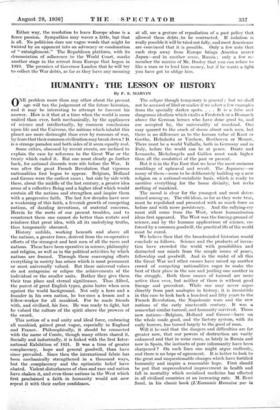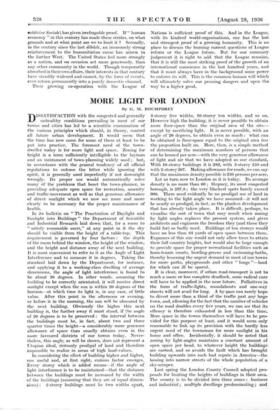HUMANITY : THE LESSON OF HISTORY
By F. S. MARVIN NE problem more than any other about the present O .age -will tax the judgement of the future historian, and it may be interesting to attempt to forecast his answer. • .How is it that at a time when the world is more unified than -ever, both mechanically, by the appliances of science and intellectually, by common conclusions upon life and the Universe, the nations which inhabit this planet are more distraught than ever by rumours of war, by fears that their common civilisation may break down ? It is a strange.paradox and both sides of it seem equally real.
Some critics, obsessed by recent- events, are inclined to explain the case by reference to the Great War or the treaty which ended it. But one must clearly go further back, for national discords were rife before the War. It was after .the great French Revolution that vigorous nationalities first began to appear. Belgium, Holland and Greece were the earliest cases ; but side by side with these, about the middle of the last century, a greater idea arose of a collective Being and a higher ideal which would contain all the nations and strengthen and- inspire them with a progressive faith. The last few decades have seen a .weakening, of this faith, a feverish growth of competing nations, of dazzling inventions, of material concerns. Herein lie the roots of our present troubles, and to counteract them one cannot do better than restate and reinforce- that great idea, with all its underlying truths, thus temporarily obscured.
History nnfolds, working beneath and above all the nations, a greater force, derived from the co-operative efforts of the strongest and best men of all the races and nations. These have been operative in science, philosophy and religion, as well as in the political activities by which nations are. framed. Through these converging efforts everything in society has arisen which is most permanent or most universally valued. But these universal values do not antagonise or eclipse the achievements of the individual or the smaller units. Rather they give them their true place and eternal significance. Thus Alfred, the purest of great English types, gains lustre when seen against the world background. Not only a hero and a founder in his -own •nation, he bee mes a lesson and a fellow-worker for all mankind. For he made friends with, and civilised, his foes. He was ready to fight, but he valued the culture of the spirit above the prowess of the sword.
This notion of a real unity and ideal force, embracing all mankind, gained great vogue, especially in England and France.. Philosophically, it should be connected with- the name of Comte, though many others shared it. Socially and industrially, it is linked with the first Inter- national Rithibition a 1851. It was a time of greater complacency, hope and general goodwill, than have since prevailed.. Since then the international fabric has been mechanically -strengthened . in a thousand ways, but the :,complacency and the optimistic belief have. abated. Violent.disturbances of class and race and nation have shaken it, and even those nations in the West which. first proclaimed a. faith- in humanity would not now repeat it with their earlier confidence. The eclipse though temporary is general ; but we shall not be accused of libel or malice if we select a few examples from the specially darker spots. . . . It is a false and dangerous idealism which exalts a Frederick or a Bismarck above the German heroes who have done good to, and are accepted by, the universality of mankind. One may quarrel to the crack of doom about such men, but there is no difference as to the human value of Kant or Goethe, Helmholtz or Virchow, Beethoven or Mozart. There must be a world Valhalla, both in Germany and in Italy, before the world can be at peace. Dante and Leonardo, Michelangelo and Galileo must rank higher than all the condottieri of the past or present.
But it is in the Far East that we hear the most ominous rumblings of upheaval and revolt. The Japanese—or many of them—seem to be deliberately building up a new religion on a national-socialistic basis, which is ready to sacrifice everything for the home divinity, but reeks nothing of mankind.
The moral is clear for the youngest and most deter- mined among us. The old ideas, so far as they were true, must be repolished and presented with as much force as before and with more persistency. And the rallying-cry must still come from the West, where humanitarian ideas first appeared. The West was the forcing-ground of science, and by the humane applications of science, en- forced by a common goodwill, the practical ills of the world must be cured.
We believe then that the broadminded historian would conclude as follows. Science and the products of inven- tion have crowded the world with possibilities and distracted our minds from the simple issues of peace, fellowship and goodwill. And in the midst of all this the Great War and other causes have raised up another crowd of competing nationalities eager to make the best of their place in the sun and jostling one another in the struggle. Both these causes of turmoil are more active than ever, but neither of them is without good lineage and precedent. While one may never argue directly from past analogies in history, it is irresistible in this case to look back a hundred and fifty years to the French Revolution, the Napoleonic wars and the ntw nations of the early nineteenth century. It was a somewhat similar turmoil, and humanity survived. Those new nations—Belgium, Holland and Greece—have on the whole made ,good, and the factory system, with its early horrors, has turned largely to the good of man.
Will it be said that the dangers and difficulties are far greater now, that our powers of destruction are vastly enhanced and that in some cases, as lately in Russia and now in Spain, the instincts of pure inhumanity have been sharpened ? On such • lines one might argue endlessly, and there is no hope of agreement. It is better to look to the great and unquestionable changes which have fortified humanity and inspire a reasonable hope. First should be put that unprecedented improvement in health and fall in mortality which socialised medicine has effected in all civilised countries at an increasing rate. M. Rene Sand, in his classic book (L'Economie Humaine par la tnideeine Sociale) has given irrefragable proof. If " human economy " in this century has made these strides, on what grounds and at what point are we to limit it ? Secondly, in the century since the lastflaficie' , an immensely strong reinforcement to the humanitarian cause has arisen in the further West. The United States feel more strongly as a nation, and on occasion act more generously, than any other community in the world. Though temporarily absorbed in their own affairs, their interests in that century have steadily widened and cannot, by the force of events, ever return permanently into a purely domestic channel.
• Their growing co-operation with the League of Nations is sufficient proof of this. And in the League, with its kindred' world-organisations, one has the last and strongest proof of a growing humanity. This is no place to discuss the burning current questions of League reform or the League future. But for our summary judgement it is right to add that the League remains, that it is still the most striking proof of the growth of an international conscience in the last hundred years, and that it must always have in the background some power to enforce its will. This is the common human will which will ultimately solve our pressing dangers and open the way to. a higher good.







































 Previous page
Previous page